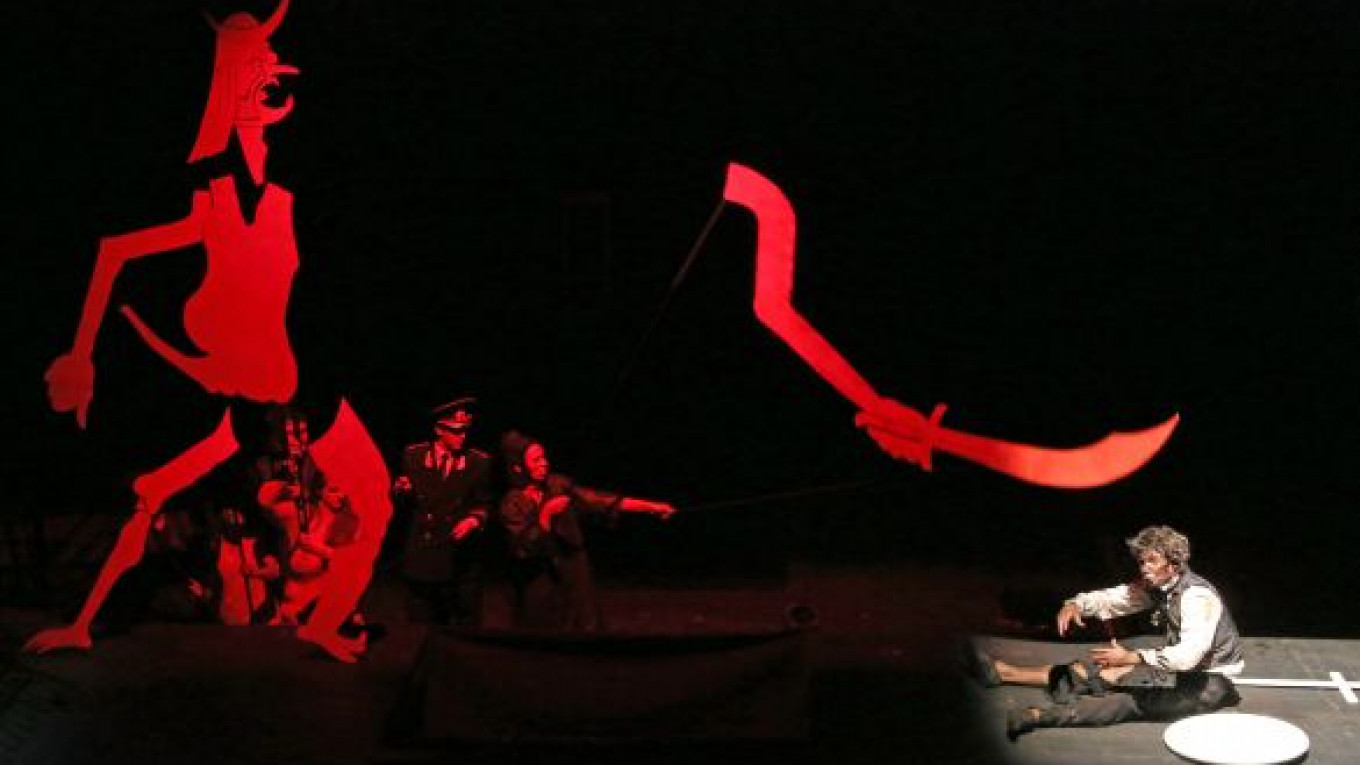It's good seeing Nikolai Roshchin have the opportunity to work with space again, as he does with his new production of "Cruaute." As a joint product of Roshchin's A.R.T.O Theater and the Meyerhold Center, this show builds on the razor-sharp aesthetics of the tiny A.R.T.O while making use of the spatial freedom that the large black box at the Meyerhold provides.
Actually, Roshchin goes way beyond that, for half of the performance takes place on Moscow's streets and in various indoor habitats, such as a restaurant and the interior of A.R.T.O, which is located several kilometers from the Meyerhold.
"Cruaute," or "cruelty" in French, refers to the work of the French theater practitioner and theorist Antonin Artaud, whose last name is echoed in the name of the A.R.T.O Theater. Artaud's "theater of cruelty" manifesto, written in the 1930s, continues to inspire and provoke people to this day.
Roshchin delves into the manifesto to make pointed commentary on the state of contemporary Moscow theater, as well as to highlight his own belief in a theater whose purpose is to share meaning rather than to entertain.
One of the real achievements of "Cruaute," however, is that it is highly entertaining. In fact, it can be downright hilarious, at least it is if you have a taste for dark humor. Roshchin pokes fun at numerous recent trends including the new drama boom and an ambitious young generation that has recently begun to dominate certain elements of Moscow's theater community.
In the most wicked of such mocking scenes, an elegant woman stands before an audience of eager theater people and blithely declares, "Listen to me and become a leader!" It is an unmistakable swipe at the much-hyped School of Theatrical Leaders that the Meyerhold Center has conducted in recent years.
Every bit as pointed and cruel is the scene where the show's anti-hero, a disgruntled though passionate actor, barges into a rehearsal of a staged reading and shoots everybody dead. "Why create a full production if you can do 30 or 40 readings in that time!?" he mutters sarcastically.
Roshchin equates the true theater artist with a terrorist, always making sure to push the comparison so far that it avoids awkward complications that such a distinction might entail if taken too seriously. Later, the actor will spend 20 minutes silently digging a grave while a small band of musicians waits patiently for him to give the sign to play. Is he burying this very show before the eyes of the increasingly restless spectators or is he burying all of contemporary theater in order to be done with it?
That will be up to each spectator to decide.
But there is no doubt that Roshchin and Dmitry Volkov, in the role of the crusading and marauding actor, are willing to throw a barrage of sucker punches at the audience.
Volkov enters the empty stage pompously spouting bits and pieces of Artaud's manifesto. "The language of theater must be freed of the word!" he declares before moving offstage with a cameraman following his every move. "Actors must be as martyrs burned at the stake," he darkly declares before apparently dousing himself with gas and setting himself afire.
From there the burnt, torn and frayed actor takes to the streets, testing his belief in a theater of true action and reality by accosting bystanders, driving loved ones to suicide and taking up arms himself. We watch these events on a screen, generally trusting that they are being provided to us by the cameraman's live feed.
A curious thing happens as this wildly exaggerated, and finely tuned, performance begins unfolding live again back on stage. Even while mocking everyone mercilessly, including his actor and himself, Roshchin actually makes his case for a theater of commitment and zeal. By the time a giant cut-out puppet begins attacking Volkov's actor, beating him down every time he tries to stand, we have come to feel a kinship with the battle he fights.
"Cruaute" is surely one of the most unique attempts ever to bring Artaud's work to life on a stage. It's also the best parody of Moscow theater I have seen in some time.
"Cruaute, a joint production of A.R.T.O Theater and the Meyerhold Center, plays Oct. 25 and 26 at 7 p.m. at the Meyerhold Center, 23 Novoslobodskaya Ulitsa. Metro Mendeleyevskaya. Tel. 495-363-1048. meyerhold.ru. Running time: 1 hour, 50 minutes.
Contact the author at jfreedman@imedia.ru


